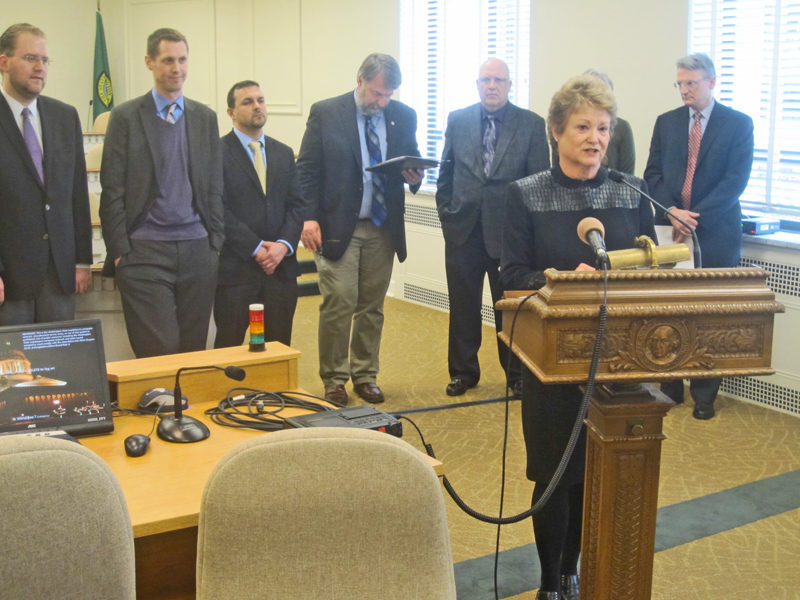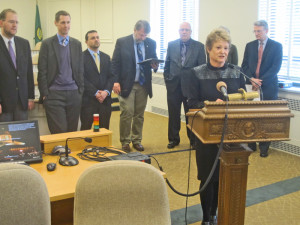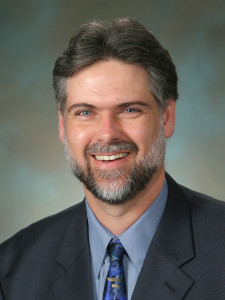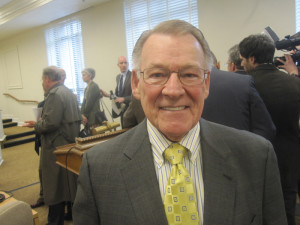OLYMPIA, Feb. 22.—There’s no way around it – any proposal to raise taxes for transportation this year is going to the voters. And that’s just one indication of the uphill road transportation advocates will travel as they promote a plan that would raise $10 billion for road construction, transit and environmental programs.
House lawmakers this week rolled out their big transportation plan, launching the biggest effort of the session for a fair-to-midsized segment of the Capitol crowd. Among other things, the proposal would boost the state gas tax by 10 cents over 10 years, raise oil taxes to pay for Puget Sound cleanup, and reimpose the car-tab tax voters rejected in 1999. Some advocates hope the Legislature will do the job itself, without referring it to the November ballot. But one way or another, voters will have their say.
If lawmakers duck a public vote, you better believe there will be a repeal effort, says Tim Eyman, the state’s leading initiative promoter. “It would be the easiest initiative we’ve ever run,” he says. And he speaks from experience: The car-tab repeal was his first big win. Even if a repeal drive stumbles somewhere along the way, the tax goes to the ballot anyway. A little-noticed provision of his long-forgotten Initiative 960, reinforced by last year’s I-1185, would require a hard-to-ignore “advisory vote.”
Think of it as a red flag right at the starting line – this effort’s not going to be easy, either in the Legislature or before the voters in fall. The state’s biggest transportation players are lining up behind the proposal with momentum that comes from more than two years of planning. There are some who argue the plan is too hot, or it’s too cold, or it’s just not transportation’s year. Already you can count on another battle with oil refiners who do not take kindly to the proposed increase in the hazardous substance tax. As with any transportation plan, this one tries to offer something for everyone. But that gives opponents plenty of targets.
A ‘Good Start’
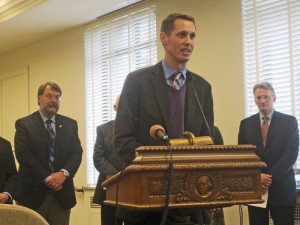
Rob Johnson of the Transportation Choices Coalition is flanked by Jeff Johnson, president of the Washington State Labor Council, and Steve Mullin, president and CEO of the Washington Roundtable.
It takes a village to raise a gas tax, and the biggest players in business and labor have a common interest. Road construction means jobs; better roads mean a stronger economy. Local governments get a share, and in the new plan, environmental groups and transit advocates get a piece of the action, too. Right now all seem to be using a variation on a single phrase: “Good start.” Their representatives stood with House Transportation Chair Judy Clibborn, D-Mercer Island, as she announced her package Wednesday. Her plan is likely to be the only big transportation proposal this year. Her Senate counterpart, Senate Transportation co-chair Curtis King, R-Yakima, says he is content to let the House take the lead, neither endorsing the plan nor ruling it out.
“Our businesses and communities continue to grow, so it is important that we keep up with the growth of the state,” Clibborn said. “At this point, we have a choice. If we do nothing, we will watch the infrastructure crumble.”
The $10 billion spending plan, whittled down from a $50 billion list compiled by the blue-ribbon “Connecting Washington” task force in 2011, aims to satisfy every major transportation constituency. That’s always part of the calculation in a transportation proposal, but it is more plainly evident in this one than in years past. Explained Clibborn, “When everyone benefits, everyone feels that they have a reason to pay their fair share, and I think you’ll see that everyone has a reason to feel that they got something out of the package.”
Making them happy enough – that’s the first problem.
Does it Go Far Enough?
The new proposal distributes $4 billion to mega-projects across the state, making sure every region gets something. It includes most of the expected candidates – among them the Columbia River Crossing at Vancouver, the North-South Freeway in Spokane, and the ongoing improvements at Snoqualmie Pass. But there’s also the expected carping. Start with Pierce County. A coalition of interests backing the extension of Highway 167 from Puyallup to the Port of Tacoma complains money allocated for that mega-project won’t see the highway all the way through. Does that mean a 10-year wait? “At this point in the process, we would have to recommend opposition to the bill and any ballot measure that does not provide a timely path to completing SR-167,” coalition leaders responded with a letter Thursday.
Then comes Seattle. Although the proposal would provide money to start extending Highway 509 from Sea-Tac in the direction of the Port of Tacoma, the Queen City itself gets nothing for its two mega-projects, the new 520 bridge or the downtown tunnel project that will replace the Alaskan Way Viaduct. While the latter project technically has its funding in place, the state has finally conceded that tunnel tolls will not be sufficient, and prior legislatures have insisted that Seattle taxpayers be made responsible for shortages – meaning local tax hikes could be the result. There’s also nothing to block the possible tolling of the I-90 bridge – another big issue for the city. The Washington Roundtable, the key business advocacy group in most transportation deliberations, is standing with Clibborn, but hopes to see the 520 bridge and I-5 repaving join the list – an acknowledgement that such proposals are always tweaked along the way. “We appreciate the leadership Rep. Clibborn has done in giving us a starting point,” Roundtable President and CEO Steve Mullin said at the Wednesday press conference.
Meanwhile, the state Labor Council opened the session arguing for a $20 billion package. “The numbers will evolve as this stuff continues,” said President Jeff Johnson.
Highest Tax in the Nation?
Then there’s the taxing side. History shows the motor vehicle excise tax to be a likely flashpoint. The proposal raises $2 billion by reimposing the tax that is generally paid by motorists when they re-register their cars. It sets a tax rate of .7 percent — $70 on a car worth $10,000. That’s about one-third of the rate in 1999 when Eyman ran his career-making repeal initiative, I-695.
The signature feature of the proposal – the gas tax increase – would be phased in over ten years, adding two cents to the price of a gallon of gas every two years. That raises $2.5 billion, and it would eventually give Washington a tax rate of 47.5 cents a gallon. That’s the highest state gas tax in the nation, complains state Rep. Ed Orcutt, R-Kalama, ranking Republican on the House Transportation Committee. And he says he is dubious about the bonding element of the plan – $3 billion in bonds would be issued in years 5 and 7, meaning that a portion of the tax increase would have to be earmarked for debt service purposes for perhaps 30 years, adding interest to the cost of construction. “Before we even entertain the idea of a gas-tax increase, we want to talk about transportation and economic reforms. We will talk more about these reforms next week. If the Democrats are willing to have this discussion, we are willing to work with them. We want to see how we can make our tax dollars go further, before we reach further into taxpayers’ pockets.”
Orcutt’s top-in-the-nation-ranking argument depends on how you look at things. According to the American Road Builders and Transportation Association, Washington’s current 37.5-cent gas tax puts it second, behind North Carolina at 37.75 cents, and thus Orcutt is correct that an immediate two-cent increase would make Washington the national leader. But that doesn’t include all taxes on gasoline; many states impose sales taxes, other excise taxes and fees that Washington does not. Take those into consideration and at current gas prices, in the latest ranking provided by the American Petroleum Institute, Washington is 9th and New York ranks first at 50.6 cents. Even if the full 10-cent increase was immediate Washington would still be a laggard.
Buying Environmental Support
No transportation proposal these days would be complete without a nod to the environmental community and their allies in transit. They’re at the table under the umbrella of the Transportation Choices Coalition. Transit agencies have been forced to make deep cuts in bus service, said executive director Rob Johnson – they get a part of the $2.1 billion allocated for transportation infrastructure. “We really want to see comprehensive solutions to a lot of the challenges that are laid out in front of us, and we think this package is a good start,” he said.
The stormwater element, though, might be seen as a clever extension of the war environmental groups have been waging since the 2009 legislative session. As a standalone issue, taxes on oil for Puget Sound cleanup have flopped. But as part of a broader package chances of a tax increase might improve. Under the plan, the state’s hazardous substance tax, levied largely on oil, would rise from .7 percent to 1 percent, generating $897 million. Already it’s looking like a renewal of an age-old battle. “Oh, I love to battle with oil,” Clibborn joked. “They are not happy.”
But just try to find nearly $1 billion somewhere else, she says. Already the Western States Petroleum Association is sounding the alarm. A broadside issued Thursday points out that oil refiners won’t eat the tax – ultimately it will passed to customers at the pump, essentially a second, hidden gas-tax hike. And you might take it as a word of warning for any prospective ballot-measure campaign: “Washington voters have shown that they’ll support a gas tax increase if it is clearly presented and they know what they are buying,” it says. “But families and businesses are watching their pocketbooks closely these days. They understand that a MTCA [Model Toxics Control Act] increase is really a tax by another name.”
Big Challenge
Duke Schaub of the Associated General Contractors says his organization has been thinking more along the lines of a larger proposal for 2014 – but with all the work done so far to bring together this one, he says his group will be lobbying hard to see if something might be accomplished this year. “We’re going to do the best lobbying job we can with all of the members we have and see if we can move this package,” he says. “Thank goodness, this time around we have got all the cities and counties with us, we’ve got transit and labor’s on board; business is on board collectively – it’s as good a shot as we’ve had in a long time.”
But cobbling something together in the Legislature is one thing. There’s an even bigger selling job ahead, involving Washington’s 4 million voters. It is hard to imagine a scenario in which their approval is bypassed. Under current law, it takes a two-thirds vote of the House and Senate to pass a tax increase without a public vote, meaning Republican votes are needed – and they’re not willing. Even though the two-thirds rule has been challenged in the Supreme Court and a ruling is due shortly, a decision to strike it down won’t change matters much. Key decisionmakers in the Senate majority caucus say they will insist on a vote. So that seems to clinch things, and spares Eyman the trouble.
“I know Rep. Clibborn put a lot of effort and thought and conversation into it, so I’m anxious to hear what the public has to say,” King says. You have to expect that all the key players would be behind it, he says, but a public still recovering from recession might have a different opinion. “When you get right down to the actual citizens of Washington state, I am very skeptical that in 2013 they are willing to do it.”
Your support matters.
Public service journalism is important today as ever. If you get something from our coverage, please consider making a donation to support our work. Thanks for reading our stuff.


